Person-Centered Approach to Diabetes Care: A Nursing Case Analysis
VerifiedAdded on 2022/07/28
|7
|1484
|18
Case Study
AI Summary
This case study critically analyzes the nursing care provided to Jessica, a 62-year-old female with type 2 diabetes mellitus, who struggles with weight and lifestyle changes. It emphasizes the importance of a person-centered approach, comprehensive patient assessment, and the role of an interdisciplinary team in enhancing her quality of life. The analysis explores necessary assessments, the collaborative approach involving various healthcare professionals, and the integration of nursing care to manage Jessica's condition effectively. The study highlights the significance of psychosocial support, lifestyle management, medical nutritional therapy, and continuous monitoring to mitigate potential complications. Ultimately, the case underscores the value of teamwork and integrative working in modern chronic illness management, particularly in diabetes care, where nurses play a crucial role in coordinating expertise and guiding patients and their families towards better health outcomes. This document is available on Desklib, a platform offering study tools and resources for students.

Running head: NURSING CARE FOR PEOPLE WITH CHRONIC ILLNESS 1
Nursing Care for People with Chronic Illness
Student’s Name
Institutional Affiliation
Nursing Care for People with Chronic Illness
Student’s Name
Institutional Affiliation
Paraphrase This Document
Need a fresh take? Get an instant paraphrase of this document with our AI Paraphraser
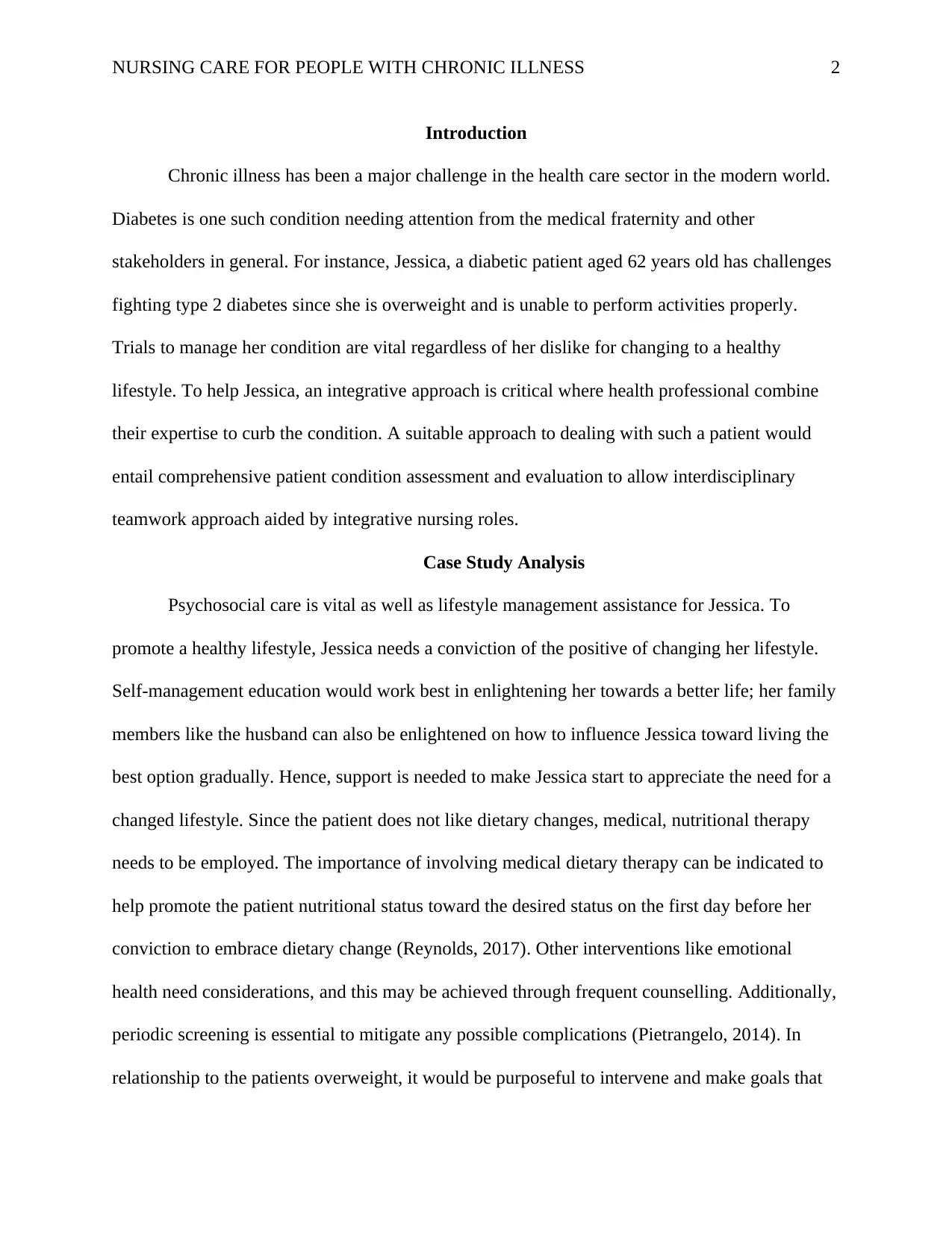
NURSING CARE FOR PEOPLE WITH CHRONIC ILLNESS 2
Introduction
Chronic illness has been a major challenge in the health care sector in the modern world.
Diabetes is one such condition needing attention from the medical fraternity and other
stakeholders in general. For instance, Jessica, a diabetic patient aged 62 years old has challenges
fighting type 2 diabetes since she is overweight and is unable to perform activities properly.
Trials to manage her condition are vital regardless of her dislike for changing to a healthy
lifestyle. To help Jessica, an integrative approach is critical where health professional combine
their expertise to curb the condition. A suitable approach to dealing with such a patient would
entail comprehensive patient condition assessment and evaluation to allow interdisciplinary
teamwork approach aided by integrative nursing roles.
Case Study Analysis
Psychosocial care is vital as well as lifestyle management assistance for Jessica. To
promote a healthy lifestyle, Jessica needs a conviction of the positive of changing her lifestyle.
Self-management education would work best in enlightening her towards a better life; her family
members like the husband can also be enlightened on how to influence Jessica toward living the
best option gradually. Hence, support is needed to make Jessica start to appreciate the need for a
changed lifestyle. Since the patient does not like dietary changes, medical, nutritional therapy
needs to be employed. The importance of involving medical dietary therapy can be indicated to
help promote the patient nutritional status toward the desired status on the first day before her
conviction to embrace dietary change (Reynolds, 2017). Other interventions like emotional
health need considerations, and this may be achieved through frequent counselling. Additionally,
periodic screening is essential to mitigate any possible complications (Pietrangelo, 2014). In
relationship to the patients overweight, it would be purposeful to intervene and make goals that
Introduction
Chronic illness has been a major challenge in the health care sector in the modern world.
Diabetes is one such condition needing attention from the medical fraternity and other
stakeholders in general. For instance, Jessica, a diabetic patient aged 62 years old has challenges
fighting type 2 diabetes since she is overweight and is unable to perform activities properly.
Trials to manage her condition are vital regardless of her dislike for changing to a healthy
lifestyle. To help Jessica, an integrative approach is critical where health professional combine
their expertise to curb the condition. A suitable approach to dealing with such a patient would
entail comprehensive patient condition assessment and evaluation to allow interdisciplinary
teamwork approach aided by integrative nursing roles.
Case Study Analysis
Psychosocial care is vital as well as lifestyle management assistance for Jessica. To
promote a healthy lifestyle, Jessica needs a conviction of the positive of changing her lifestyle.
Self-management education would work best in enlightening her towards a better life; her family
members like the husband can also be enlightened on how to influence Jessica toward living the
best option gradually. Hence, support is needed to make Jessica start to appreciate the need for a
changed lifestyle. Since the patient does not like dietary changes, medical, nutritional therapy
needs to be employed. The importance of involving medical dietary therapy can be indicated to
help promote the patient nutritional status toward the desired status on the first day before her
conviction to embrace dietary change (Reynolds, 2017). Other interventions like emotional
health need considerations, and this may be achieved through frequent counselling. Additionally,
periodic screening is essential to mitigate any possible complications (Pietrangelo, 2014). In
relationship to the patients overweight, it would be purposeful to intervene and make goals that
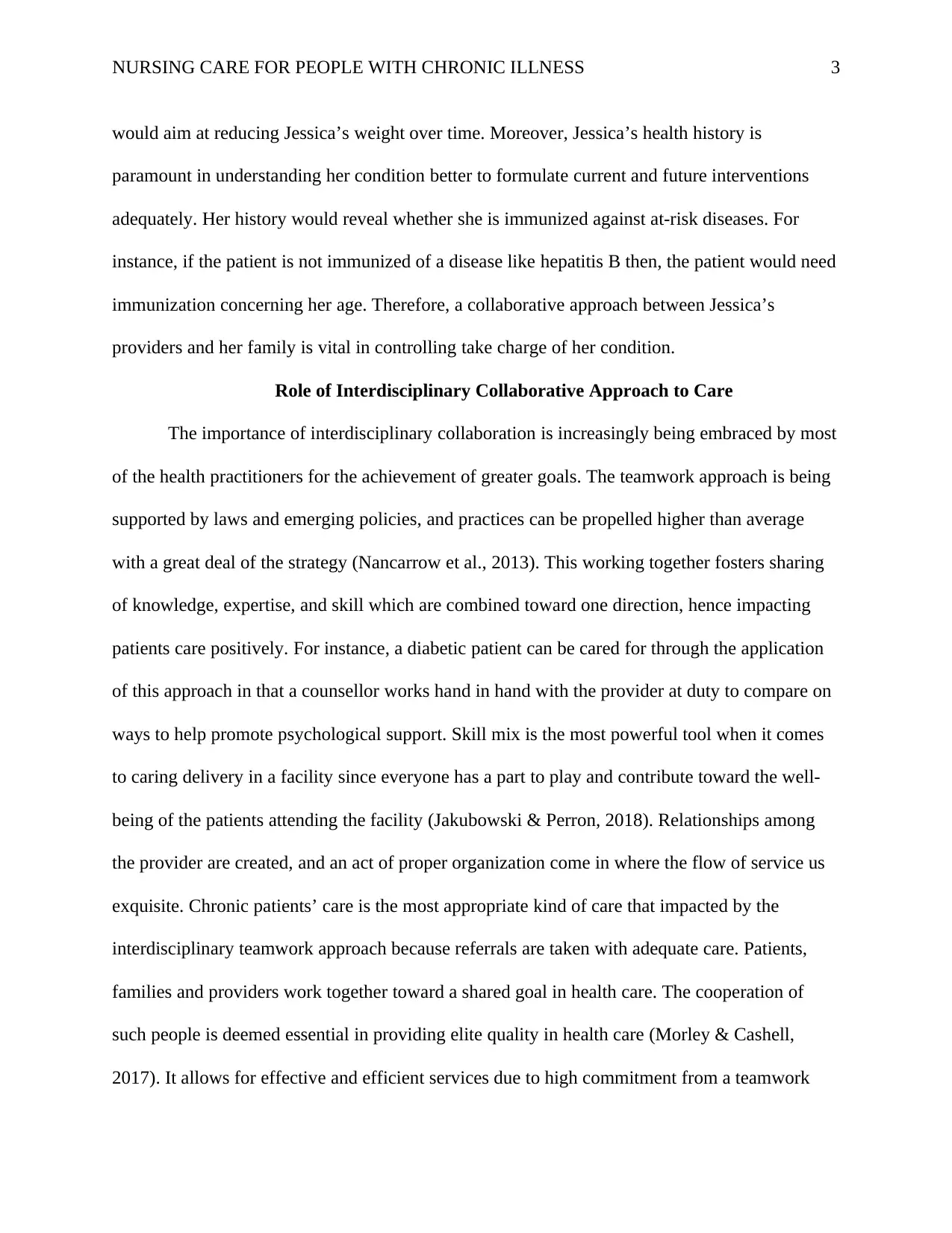
NURSING CARE FOR PEOPLE WITH CHRONIC ILLNESS 3
would aim at reducing Jessica’s weight over time. Moreover, Jessica’s health history is
paramount in understanding her condition better to formulate current and future interventions
adequately. Her history would reveal whether she is immunized against at-risk diseases. For
instance, if the patient is not immunized of a disease like hepatitis B then, the patient would need
immunization concerning her age. Therefore, a collaborative approach between Jessica’s
providers and her family is vital in controlling take charge of her condition.
Role of Interdisciplinary Collaborative Approach to Care
The importance of interdisciplinary collaboration is increasingly being embraced by most
of the health practitioners for the achievement of greater goals. The teamwork approach is being
supported by laws and emerging policies, and practices can be propelled higher than average
with a great deal of the strategy (Nancarrow et al., 2013). This working together fosters sharing
of knowledge, expertise, and skill which are combined toward one direction, hence impacting
patients care positively. For instance, a diabetic patient can be cared for through the application
of this approach in that a counsellor works hand in hand with the provider at duty to compare on
ways to help promote psychological support. Skill mix is the most powerful tool when it comes
to caring delivery in a facility since everyone has a part to play and contribute toward the well-
being of the patients attending the facility (Jakubowski & Perron, 2018). Relationships among
the provider are created, and an act of proper organization come in where the flow of service us
exquisite. Chronic patients’ care is the most appropriate kind of care that impacted by the
interdisciplinary teamwork approach because referrals are taken with adequate care. Patients,
families and providers work together toward a shared goal in health care. The cooperation of
such people is deemed essential in providing elite quality in health care (Morley & Cashell,
2017). It allows for effective and efficient services due to high commitment from a teamwork
would aim at reducing Jessica’s weight over time. Moreover, Jessica’s health history is
paramount in understanding her condition better to formulate current and future interventions
adequately. Her history would reveal whether she is immunized against at-risk diseases. For
instance, if the patient is not immunized of a disease like hepatitis B then, the patient would need
immunization concerning her age. Therefore, a collaborative approach between Jessica’s
providers and her family is vital in controlling take charge of her condition.
Role of Interdisciplinary Collaborative Approach to Care
The importance of interdisciplinary collaboration is increasingly being embraced by most
of the health practitioners for the achievement of greater goals. The teamwork approach is being
supported by laws and emerging policies, and practices can be propelled higher than average
with a great deal of the strategy (Nancarrow et al., 2013). This working together fosters sharing
of knowledge, expertise, and skill which are combined toward one direction, hence impacting
patients care positively. For instance, a diabetic patient can be cared for through the application
of this approach in that a counsellor works hand in hand with the provider at duty to compare on
ways to help promote psychological support. Skill mix is the most powerful tool when it comes
to caring delivery in a facility since everyone has a part to play and contribute toward the well-
being of the patients attending the facility (Jakubowski & Perron, 2018). Relationships among
the provider are created, and an act of proper organization come in where the flow of service us
exquisite. Chronic patients’ care is the most appropriate kind of care that impacted by the
interdisciplinary teamwork approach because referrals are taken with adequate care. Patients,
families and providers work together toward a shared goal in health care. The cooperation of
such people is deemed essential in providing elite quality in health care (Morley & Cashell,
2017). It allows for effective and efficient services due to high commitment from a teamwork
⊘ This is a preview!⊘
Do you want full access?
Subscribe today to unlock all pages.

Trusted by 1+ million students worldwide
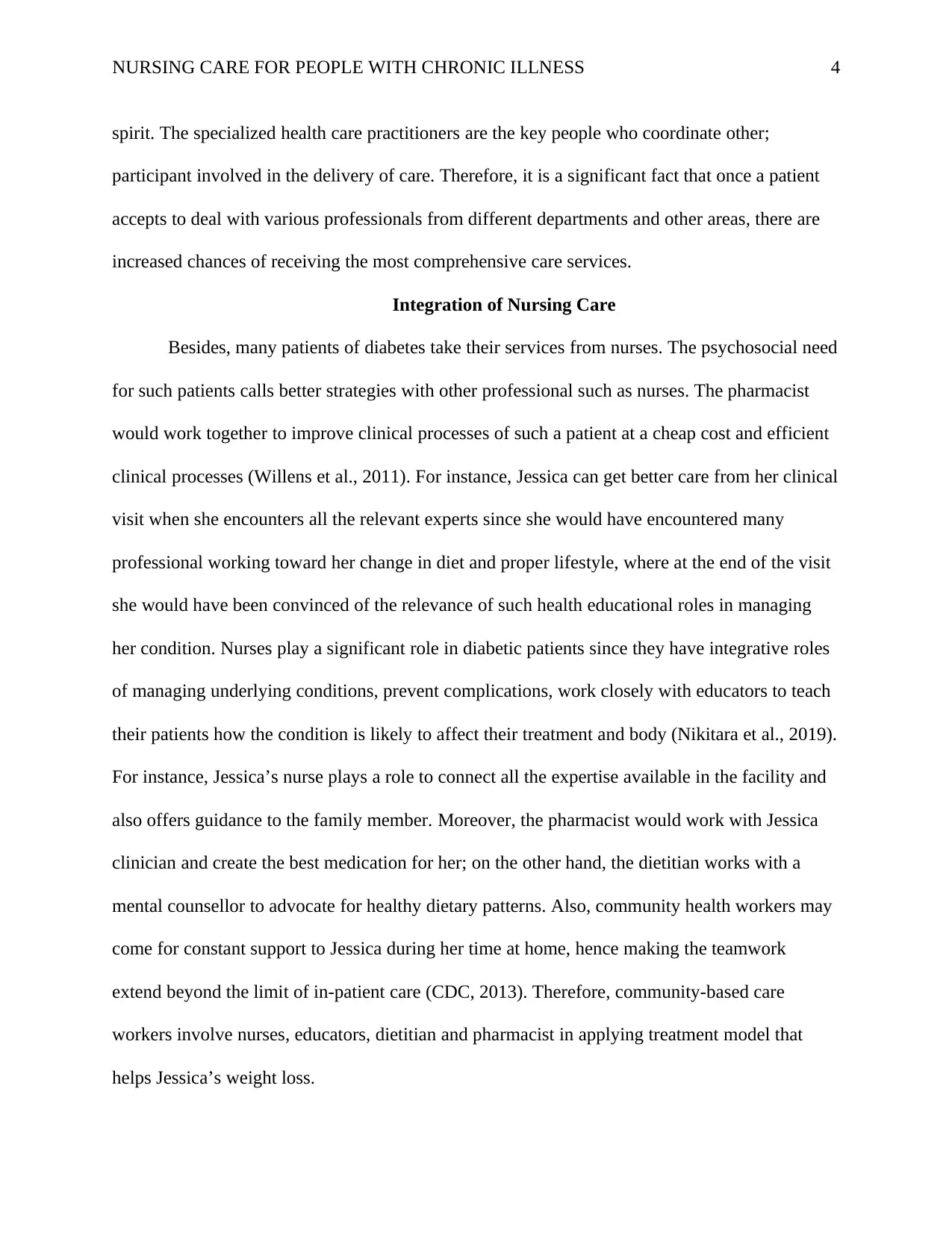
NURSING CARE FOR PEOPLE WITH CHRONIC ILLNESS 4
spirit. The specialized health care practitioners are the key people who coordinate other;
participant involved in the delivery of care. Therefore, it is a significant fact that once a patient
accepts to deal with various professionals from different departments and other areas, there are
increased chances of receiving the most comprehensive care services.
Integration of Nursing Care
Besides, many patients of diabetes take their services from nurses. The psychosocial need
for such patients calls better strategies with other professional such as nurses. The pharmacist
would work together to improve clinical processes of such a patient at a cheap cost and efficient
clinical processes (Willens et al., 2011). For instance, Jessica can get better care from her clinical
visit when she encounters all the relevant experts since she would have encountered many
professional working toward her change in diet and proper lifestyle, where at the end of the visit
she would have been convinced of the relevance of such health educational roles in managing
her condition. Nurses play a significant role in diabetic patients since they have integrative roles
of managing underlying conditions, prevent complications, work closely with educators to teach
their patients how the condition is likely to affect their treatment and body (Nikitara et al., 2019).
For instance, Jessica’s nurse plays a role to connect all the expertise available in the facility and
also offers guidance to the family member. Moreover, the pharmacist would work with Jessica
clinician and create the best medication for her; on the other hand, the dietitian works with a
mental counsellor to advocate for healthy dietary patterns. Also, community health workers may
come for constant support to Jessica during her time at home, hence making the teamwork
extend beyond the limit of in-patient care (CDC, 2013). Therefore, community-based care
workers involve nurses, educators, dietitian and pharmacist in applying treatment model that
helps Jessica’s weight loss.
spirit. The specialized health care practitioners are the key people who coordinate other;
participant involved in the delivery of care. Therefore, it is a significant fact that once a patient
accepts to deal with various professionals from different departments and other areas, there are
increased chances of receiving the most comprehensive care services.
Integration of Nursing Care
Besides, many patients of diabetes take their services from nurses. The psychosocial need
for such patients calls better strategies with other professional such as nurses. The pharmacist
would work together to improve clinical processes of such a patient at a cheap cost and efficient
clinical processes (Willens et al., 2011). For instance, Jessica can get better care from her clinical
visit when she encounters all the relevant experts since she would have encountered many
professional working toward her change in diet and proper lifestyle, where at the end of the visit
she would have been convinced of the relevance of such health educational roles in managing
her condition. Nurses play a significant role in diabetic patients since they have integrative roles
of managing underlying conditions, prevent complications, work closely with educators to teach
their patients how the condition is likely to affect their treatment and body (Nikitara et al., 2019).
For instance, Jessica’s nurse plays a role to connect all the expertise available in the facility and
also offers guidance to the family member. Moreover, the pharmacist would work with Jessica
clinician and create the best medication for her; on the other hand, the dietitian works with a
mental counsellor to advocate for healthy dietary patterns. Also, community health workers may
come for constant support to Jessica during her time at home, hence making the teamwork
extend beyond the limit of in-patient care (CDC, 2013). Therefore, community-based care
workers involve nurses, educators, dietitian and pharmacist in applying treatment model that
helps Jessica’s weight loss.
Paraphrase This Document
Need a fresh take? Get an instant paraphrase of this document with our AI Paraphraser
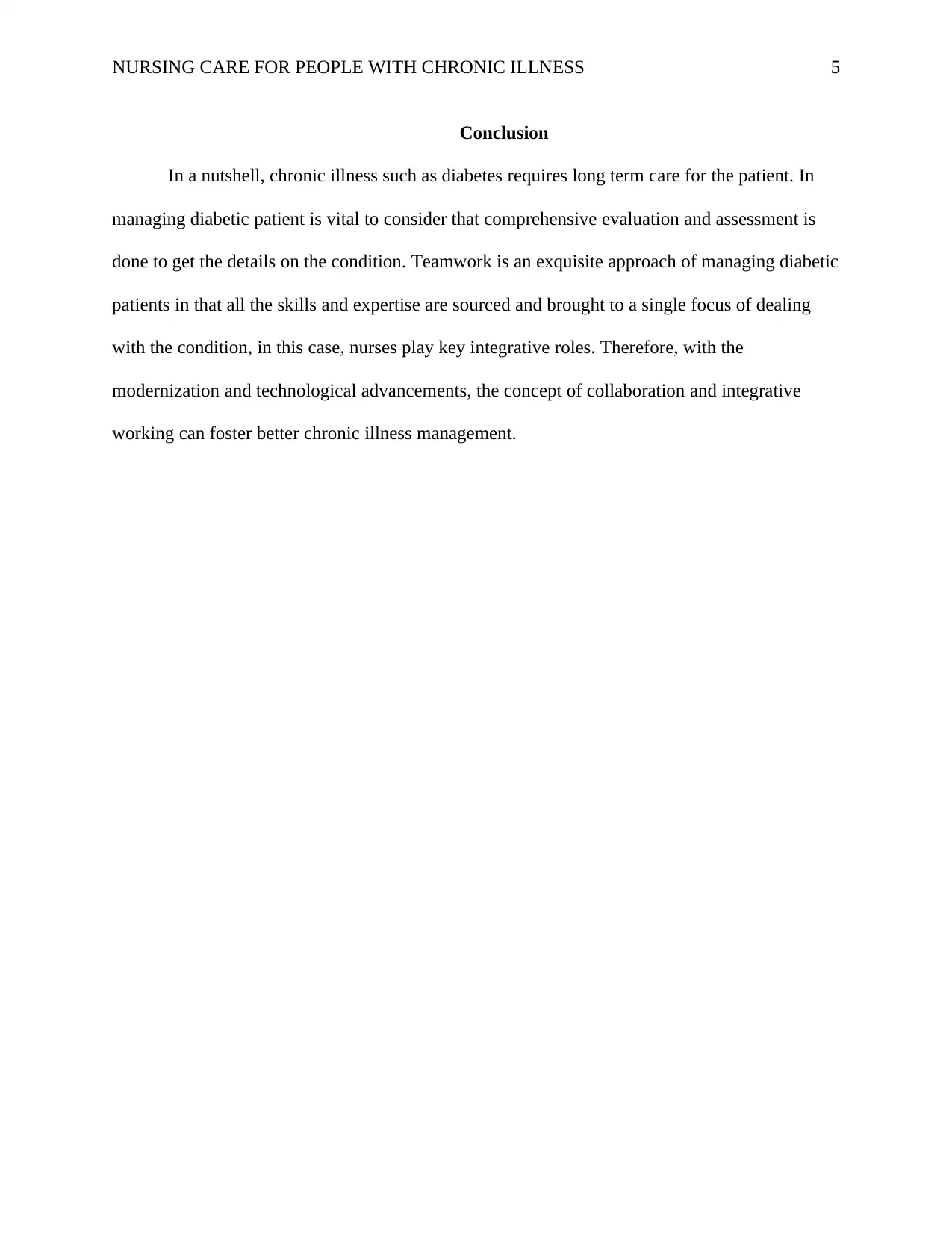
NURSING CARE FOR PEOPLE WITH CHRONIC ILLNESS 5
Conclusion
In a nutshell, chronic illness such as diabetes requires long term care for the patient. In
managing diabetic patient is vital to consider that comprehensive evaluation and assessment is
done to get the details on the condition. Teamwork is an exquisite approach of managing diabetic
patients in that all the skills and expertise are sourced and brought to a single focus of dealing
with the condition, in this case, nurses play key integrative roles. Therefore, with the
modernization and technological advancements, the concept of collaboration and integrative
working can foster better chronic illness management.
Conclusion
In a nutshell, chronic illness such as diabetes requires long term care for the patient. In
managing diabetic patient is vital to consider that comprehensive evaluation and assessment is
done to get the details on the condition. Teamwork is an exquisite approach of managing diabetic
patients in that all the skills and expertise are sourced and brought to a single focus of dealing
with the condition, in this case, nurses play key integrative roles. Therefore, with the
modernization and technological advancements, the concept of collaboration and integrative
working can foster better chronic illness management.
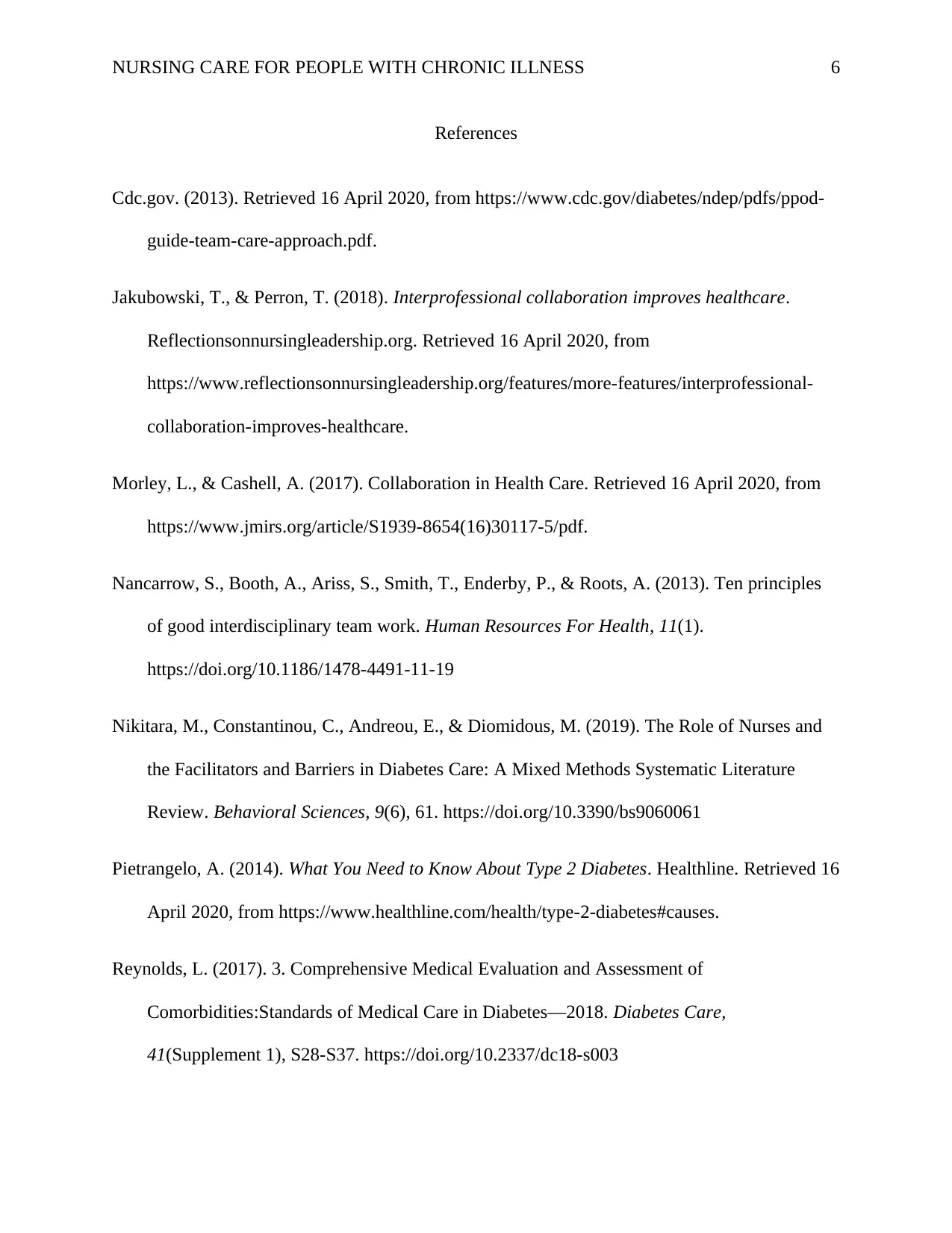
NURSING CARE FOR PEOPLE WITH CHRONIC ILLNESS 6
References
Cdc.gov. (2013). Retrieved 16 April 2020, from https://www.cdc.gov/diabetes/ndep/pdfs/ppod-
guide-team-care-approach.pdf.
Jakubowski, T., & Perron, T. (2018). Interprofessional collaboration improves healthcare.
Reflectionsonnursingleadership.org. Retrieved 16 April 2020, from
https://www.reflectionsonnursingleadership.org/features/more-features/interprofessional-
collaboration-improves-healthcare.
Morley, L., & Cashell, A. (2017). Collaboration in Health Care. Retrieved 16 April 2020, from
https://www.jmirs.org/article/S1939-8654(16)30117-5/pdf.
Nancarrow, S., Booth, A., Ariss, S., Smith, T., Enderby, P., & Roots, A. (2013). Ten principles
of good interdisciplinary team work. Human Resources For Health, 11(1).
https://doi.org/10.1186/1478-4491-11-19
Nikitara, M., Constantinou, C., Andreou, E., & Diomidous, M. (2019). The Role of Nurses and
the Facilitators and Barriers in Diabetes Care: A Mixed Methods Systematic Literature
Review. Behavioral Sciences, 9(6), 61. https://doi.org/10.3390/bs9060061
Pietrangelo, A. (2014). What You Need to Know About Type 2 Diabetes. Healthline. Retrieved 16
April 2020, from https://www.healthline.com/health/type-2-diabetes#causes.
Reynolds, L. (2017). 3. Comprehensive Medical Evaluation and Assessment of
Comorbidities:Standards of Medical Care in Diabetes—2018. Diabetes Care,
41(Supplement 1), S28-S37. https://doi.org/10.2337/dc18-s003
References
Cdc.gov. (2013). Retrieved 16 April 2020, from https://www.cdc.gov/diabetes/ndep/pdfs/ppod-
guide-team-care-approach.pdf.
Jakubowski, T., & Perron, T. (2018). Interprofessional collaboration improves healthcare.
Reflectionsonnursingleadership.org. Retrieved 16 April 2020, from
https://www.reflectionsonnursingleadership.org/features/more-features/interprofessional-
collaboration-improves-healthcare.
Morley, L., & Cashell, A. (2017). Collaboration in Health Care. Retrieved 16 April 2020, from
https://www.jmirs.org/article/S1939-8654(16)30117-5/pdf.
Nancarrow, S., Booth, A., Ariss, S., Smith, T., Enderby, P., & Roots, A. (2013). Ten principles
of good interdisciplinary team work. Human Resources For Health, 11(1).
https://doi.org/10.1186/1478-4491-11-19
Nikitara, M., Constantinou, C., Andreou, E., & Diomidous, M. (2019). The Role of Nurses and
the Facilitators and Barriers in Diabetes Care: A Mixed Methods Systematic Literature
Review. Behavioral Sciences, 9(6), 61. https://doi.org/10.3390/bs9060061
Pietrangelo, A. (2014). What You Need to Know About Type 2 Diabetes. Healthline. Retrieved 16
April 2020, from https://www.healthline.com/health/type-2-diabetes#causes.
Reynolds, L. (2017). 3. Comprehensive Medical Evaluation and Assessment of
Comorbidities:Standards of Medical Care in Diabetes—2018. Diabetes Care,
41(Supplement 1), S28-S37. https://doi.org/10.2337/dc18-s003
⊘ This is a preview!⊘
Do you want full access?
Subscribe today to unlock all pages.

Trusted by 1+ million students worldwide

NURSING CARE FOR PEOPLE WITH CHRONIC ILLNESS 7
Willens, D., Cripps, R., Wilson, A., Wolff, K., & Rothman, R. (2011). Interdisciplinary Team
Care for Diabetic Patients by Primary Care Physicians, Advanced Practice Nurses, and
Clinical Pharmacists. Clinical Diabetes, 29(2), 60-68.
https://doi.org/10.2337/diaclin.29.2.60
Willens, D., Cripps, R., Wilson, A., Wolff, K., & Rothman, R. (2011). Interdisciplinary Team
Care for Diabetic Patients by Primary Care Physicians, Advanced Practice Nurses, and
Clinical Pharmacists. Clinical Diabetes, 29(2), 60-68.
https://doi.org/10.2337/diaclin.29.2.60
1 out of 7
Related Documents
Your All-in-One AI-Powered Toolkit for Academic Success.
+13062052269
info@desklib.com
Available 24*7 on WhatsApp / Email
![[object Object]](/_next/static/media/star-bottom.7253800d.svg)
Unlock your academic potential
Copyright © 2020–2026 A2Z Services. All Rights Reserved. Developed and managed by ZUCOL.





